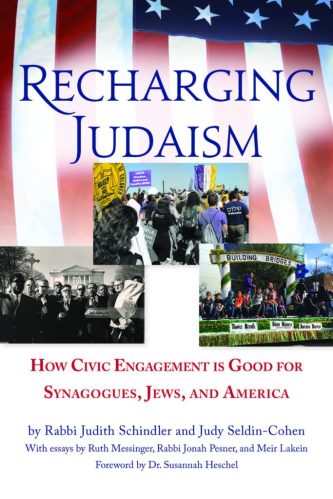
Judy Seldin-Cohen, a community advocate and author, shares insights on cowriting Recharging Judaism: How Civic Engagement Is Good for Synagogues, Jews, and America.
How did you come to serve as the coauthor of Recharging Judaism?
I had partnered with my synagogue rabbi, Rabbi Judith Schindler, for more than a decade on civic engagement initiatives, plus chairing synagogue committees, serving on the board, and representing the synagogue in the community. What started as our memoir about collaborating with churches in the Bible Belt became instead a national research project demonstrating how civic engagement strengthens synagogues, empowers us as Jews, and brings more justice to our country––the thesis of Recharging Judaism.
What is your most important advice for institutional leaders who want to enlist their community members in advocacy efforts?
Don’t pick your issue in a conference room. Talk to the members of your community to discern the issues that matter to them—not through a survey, but with thoughtful conversations one-on-one or in small groups. The advocacy issue will emerge, as will passionate volunteer leaders who will be critical to executing the work.
What was the most challenging part of writing this book?
Rabbis and lay leaders think differently, which enriched our book but also challenged us as we started the writing process. My coauthor drafted paragraphs to inspire; I wrote logical arguments and detailed instructions. Eventually, we found our joint voice––more specifics than in a sermon, but less dry than a how-to manual.
Recharging Judaism was published in 2018. Do you think that the book speaks differently to us today?
Recharging Judaism offers timeless counsel to leaders of Jewish institutions: Travel upstream to address the sources of crisis in your community. Step outside your synagogue walls to build community with Jews and people of other religions. Respond thoughtfully to congregants’ complaints with lessons from Jewish teachings and with the realities of other congregations’ experiences.
What do you want readers to take away from the book?
Build a choir of voices seeking change, both within your synagogue and in your community. Mobilizing your congregation requires your rabbi as soloist and a diverse choir of lay leaders. Singing together with other choirs requires relationships in your community across boundaries of faith and race, and the willingness to trust a conductor whose experiences differ from your own.
Judy Seldin-Cohen is available to teach on topics in the book. Email bookevents@ccarpress.org for more information.
Judy Seldin-Cohen is a community advocate and author. After working in the business sector, she spent many years working on social justice issues with Rabbi Judith Schindler, her then-synagogue rabbi and now her coauthor. Together, they have collaborated on Recharging Judaism: How Civic Engagement Is Good for Synagogues, Jews, and America (CCAR Press, 2018) among other projects.







